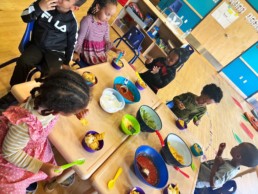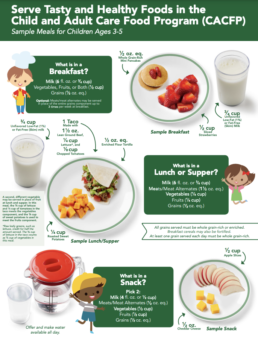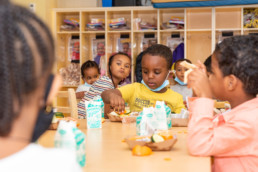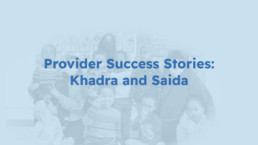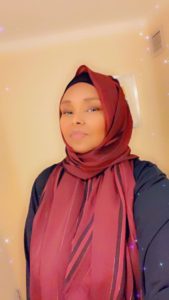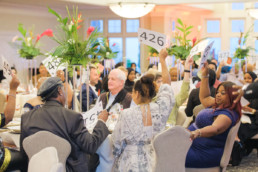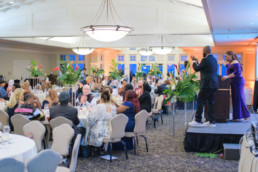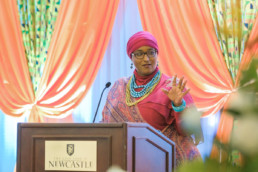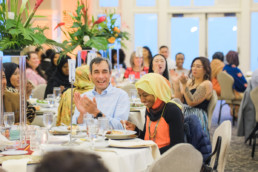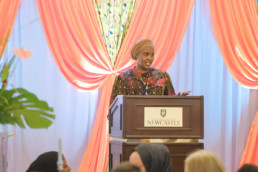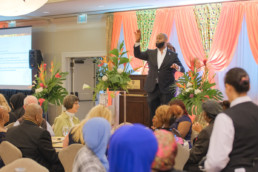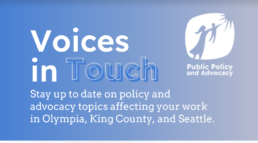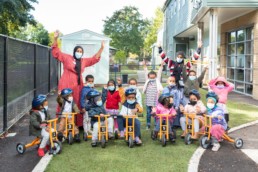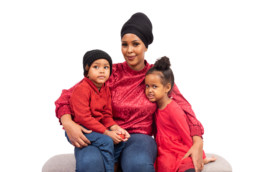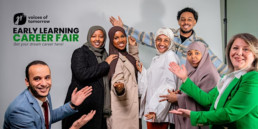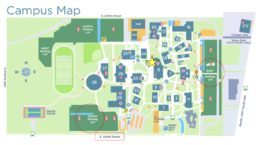Fostering Health and Nutrition: Empowering children through Voices of Tomorrow's new Nutrition Program
Voices of Tomorrow (VOT) has started implementing its latest program, the Child and Adult Care Food Program (CACFP), to ensure children being cared for by our network of providers have access to good quality, nutritious meals. CACFP is a USDA-funded childhood nutrition program for qualifying daycare homes who meet the requirements set by the state. It plays a vital role in making nutritious food more accessible to low-income children, families, and providers. By providing children with nutritious and well-balanced meals, we hope to nourish their young minds and continue to help them flourish.
Through this program, dedicated caregivers personally invest in providing nourishing meals and snacks to the children under their care. If they are eligible and if the meals align with the prescribed nutritional guidelines, the CACFP steps in to reimburse providers for two meals and one snack per child on a daily basis. The program is targeted toward children under the age of 12 and homeless youth up to the age of 18. It helps improve the quality of daycare homes by making well-balanced meals more affordable, and it allows providers to supply the children in their care with high quality nutritious meals as well as get reimbursed for related expenses.
Najib Hassan, VOT’s CACFP program administrator and monitoring specialist, oversees the verification of eligibility criteria to determine whether daycare homes qualify for program enrollment.
“Our primary focus is ensuring the providers voices are being heard within this program,” he said. “Having someone who understands you is key, so sharing the same culture and background makes it more comfortable for them to voice their concerns.”
Families with limited financial means also benefit from the program, as it equips their children with the essential resources required for healthy growth and the cultivation of positive habits. By focusing on children under 12 and extending support to homeless youth up to 18, the program touches on a critical period of growth and development.
One of VOT’s core values is being culturally responsive, which makes the implementation of this new program not just fitting but essential. CACFP promotes fairness, community involvement, and cultural understanding to ensure that everyone has a positive and meaningful experience. There are other organizations that sponsor this program, but many of VOT’s providers are East Africans and English is not their first language. That’s where VOT steps in to provide language support and make a culturally responsive program. As an organization deeply intertwined with the community, introducing this program is a natural progression, as it is a vital resource to many providers and families, we are already dedicated to assisting.
In embracing the CACFP, Voices of Tomorrow is not only introducing a new initiative but also upholding the commitment to fostering holistic growth within our communities. As CACFP emerges as a promising childhood nutritional program, it offers a glimpse of our organization’s dedication to quality, equity, and cultural responsiveness in action.
Through the thoughtful leadership of Najib Hassan, CACFP embodies VOT’s values of inclusivity and understanding, reaffirming that the pathway to a more promising tomorrow begins with nourishing the voices of today.
The Mind, Body, and Culture wraps up its second year with notable successes
Voices of Tomorrow’s Mind, Body, and Culture program is the first of its kind to integrate home visits with trauma-informed therapy. The two-year pilot phase of the MBC program, which is aimed at families and children from birth to age 3, finished with notable successes in assisting families and enhancing parent–child connections. This ground-breaking initiative gave over a thousand resources to families which provided critical support, especially during the COVID-19 pandemic. These resources included necessities like diapers, wipes, strollers, car seats, and winter clothes.
Since its inception, it has demonstrated its value in treating mental health and creating resilient families. So far, more than 60 families have received assistance from the MBC program, building a community of parents through its "Promoting First Relationships" curriculum. Beyond verbal communication, the MBC program helps parents build stronger bonds with their young children. The program also offers parents activities and suggestions to include and encourage for their older children, extending its reach to older siblings in East African immigrant and refugee households.
The MBC program’s impact extends beyond children. One of its most remarkable accomplishments to date is its commitment to helping parents pursue their educational and career aspirations. Many parents signed up for the fall semester of school, and the program assisted them with FAFSA and the application process. Through their efforts to help parents in addition to children, the MBC program opens doors of opportunity and success for the entire family.
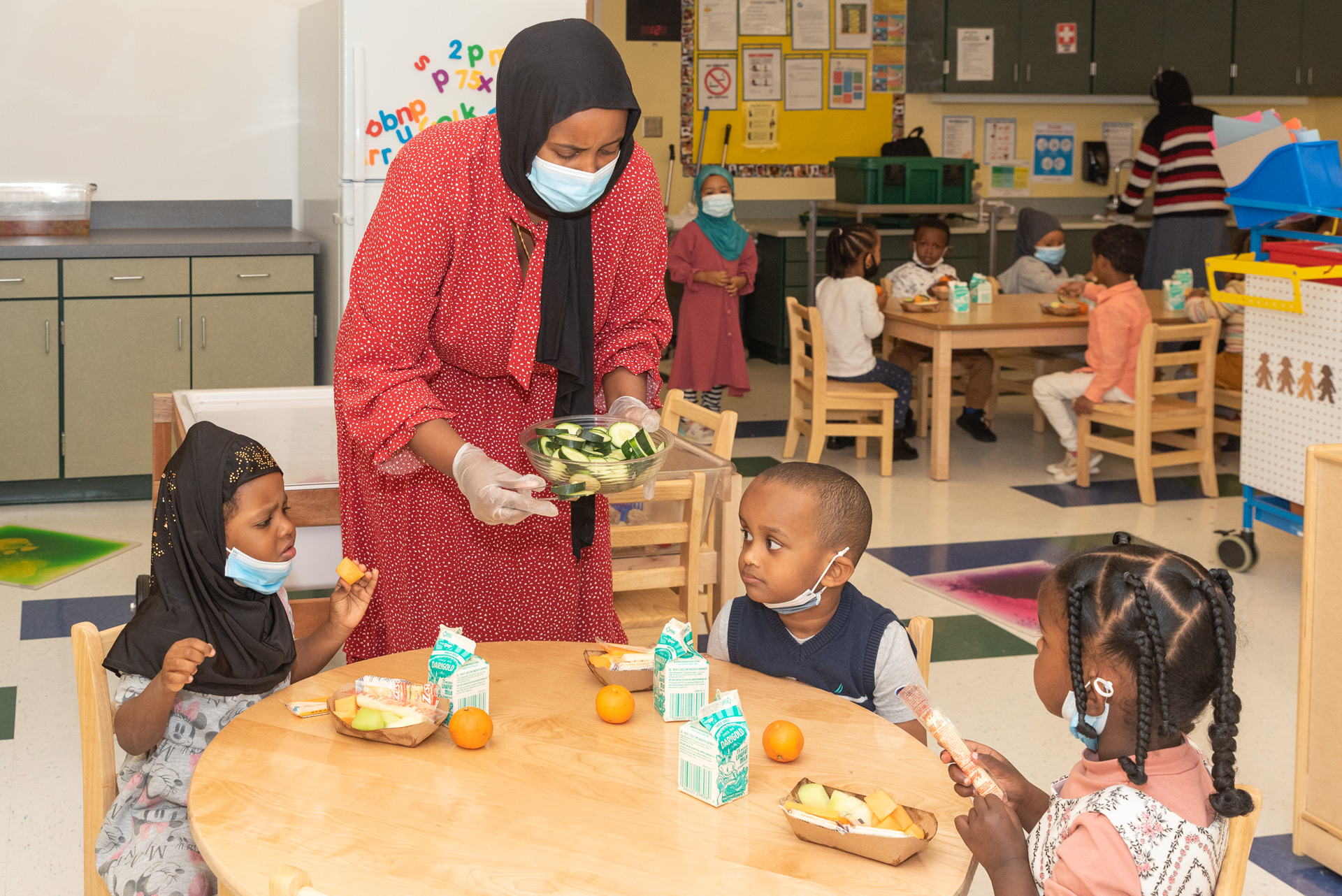
Another way that the MBC program fosters a close-knit community is that it allows parents to engage in an open dialogue about the issues and shared experiences that affect them. The program demonstrates Voices of Tomorrow’s dedication to respecting and understanding various cultural backgrounds through health-related topics, like making wise decisions during Ramadan.
During the two-year pilot phase, home visitors continued their efforts to link families with resources and pathways to stability despite having to contend with busy schedules and parents returning to school or work. The program's flexibility allows parents to request help with everything they need, assuring a customized strategy to handle their circumstances.
VOT is devoted to helping families even throughout the summer as the staff move into their planning phase. The MBC program is structured around the family, devoting an hour to meetings with parents, with the first half concentrating on establishing the first connections. The remaining time is spent addressing any unique requirements parents may have and creating a secure and encouraging atmosphere.
By surveying families at the beginning of the program, the MBC team is able to monitor changes and advancement throughout time, highlighting the program's success in fostering positive improvements in families' lives.
Voices of Tomorrow’s MBC program is committed to enhancing and expanding the influence it has on local families. The program's effectiveness and ongoing demand for its services have encouraged its continuous development to guarantee that East African immigrant and refugee families continue getting the resources and help they deserve.
Provider Success Stories: Khadra and Saida
 Interview with Khadra Hassan
Interview with Khadra Hassan
“The technical support team has helped me to the best of their ability, Hafsa Mohamed specifically has helped me with the Renovation grant and multiple other grants but that one was a big project, and it was eventually approved.I cannot even begin to put into words how beneficial it has been and how thankful I am to them for their support. I get informed of new grants and latest updates all the time; they also host information sessions which are helpful. Having a support team who are in the system and consist of people who speak the same language as me and have the same culture creates a sense of confidence to be able to ask them any questions I might have. These services are particularly important to have available to providers like me because they work to bring useful grants and information to my attention.
It makes me comfortable hearing things being explained in my language and it is more important than receiving that same information in English because some of us have a language barrier. Even if we talked all day, I could not effectively communicate how important it is to receive this help from Voices of Tomorrow. I am glad I found them. They are different from other services because of the specific community they focus on, in this country there is systemic racism and staff that have the same background are more likely to help you more sincerely while other people could be biased towards you based on your skin color or name. There are stereotypes on people speaking a different language they automatically might assume you don't have the ability to understand, which is not true it's just that there is a language barrier and most of us have learned and become successful in our homeland but how do you get that across to someone who doesn't speak the same language? Language does not equal knowledge because most of us have wisdom and have been through hardships like civil war, but we are still resilient.
So having someone from the same background supporting you is not something to take lightly. It creates comfortability to ask any question you might feel you need to know and guide you in the right direction even if something goes wrong while you might restrict yourself with another person based on the possibility that it might be taken out of context.”
Interview with Saida Alim
VOT: “Tell me about your experience with the support team in your own words?”
Saida Alim: “I attended several information sessions about grants. It helped me understand the grant better and decided if it was a good fit for me beforehand. Each session breaks down deadlines and what to prioritize, so overall it has been extremely helpful. The first grant I worked with Voices of Tomorrow on was the Child Care Stabilization grant, they focused on receipt collection, penalties, what is allowed and what is not, and most of all it helped me prepare in case there was an audit. They gave us diverse ways to not only keep track of our receipts but to prevent them from getting deleted or going missing. The session helped me be more mindful of how I currently keep track of my receipts. These sessions are an effective way to give providers the confidence to apply for funding and use it for what it is meant for.”
VOT: “Why is it important to have services like this available to childcare providers?”
Saida Alim: “The better question is why would it not be important? It is people from your own community teaching you step by step on how to successfully comply with WAC requirements, rules, and policies, how to troubleshoot your handbook in case there is a grant coming up and you do not have the correct wording to apply. VOT (Voices of Tomorrow) speaks on behalf of providers when it comes to DCYF (Department of Children, Youth, and Families) with things like daycare providers being shut down for minor things that could have been prevented. VOT is a backbone for providers because they have someone that is a representative of them that speaks their language and has the same background, so I believe VOT is a valuable tool for providers.
VOT: “Would you recommend the service to others?”
Saida Alim: “In a heartbeat. Just knowing that they are there for me gives me ease, if I have a question that they are there to answer it. Just by their existence, I know I have support even if I do not use some of their other services. If more providers knew the benefits of some of the programs I have participated in, they would be singing songs about you all.”
2023 Auction and Gala Fundraiser raises over $100,000 for East African early learning facility.
The Voices of Tomorrow Auction Gala on Friday, June 9th, 2023 at the Golf Club at Newcastle was a glamorous and fun-filled evening that left a lasting impact on the donors, distinguished guests, and the future legacy of VOT. Set against a gorgeous backdrop with panoramic views of Seattle and Bellevue, guests arrived with excitement, dressed to the nines, ready to support our cause and make a difference. Thanks to the success of this event, Voices of Tomorrow raised about $100,000 to go toward building the first East African Early Learning Center in the region. It will enable us to serve even more families and children through behavioral health programs and additional early learning classrooms.
The live auction took center stage at the gala, offering up exclusive items and experiences for bidding. The items up for auction included beautiful works of art, hand carved African artifacts, a cabin stay near Mt. Rainier and a week-long resort stay in the Bahamas. The attendees inspiring’ enthusiasm and generosity played a big role in creating a successful night to remember. The funds raised will undoubtedly empower Voices of Tomorrow to continue our invaluable work, supporting and guiding the East African community through trauma counseling, healing, and mental health programs. Our donors and sponsors played a crucial role in making all this possible, showing incredible support and generosity. To all who attended, your belief in the mission of Voices of Tomorrow and your willingness to contribute will always be remembered.
We extend our deepest gratitude to each and every one of you for your unwavering commitment to nurturing the voices of the future. We also express our sincere appreciation to the dedicated team of volunteers, event organizers, and staff members who worked tirelessly behind the scenes, ensuring flawless execution with their meticulous planning, attention to detail, and passion for the cause. We look forward to the fruits of our labor, and continuing our valuable work to ensure each child grows up to be successful and proud of their heritage!
Voices in Touch Newsletter: Edition 2
Stay up to date on policy and advocacy topics affecting your work in Olympia, King County, and Seattle.
2024 Brings a New Governor to Washington, and Candidates are Heating Up Their Campaigns. Now is the time to get registered to vote and mail in your ballots!
THE RUNDOWN
In early May, Washington’s three term Governor, Jay Inslee, announced his decision to not seek reelection. The popular Governor’s departure leaves an opportunity for Democrat and Republican candidates alike to share a new vision for the state.
So, Who Is In the Running?
TOP DEMOCRAT CANDIDATES
Bob Ferguson: The current Attorney General, and the early top pick amongst all candidates. Ferguson’s lists numerous priorities in his campaign announcement, including defending civil rights, protecting the environment, and standing up for working families.
Hilary Franz: As current Commissioner of Public Lands, it is no surprise Franz cites climate change as one of her top priorities. She also lists housing, and income inequality as key challenges to tackle.
Mark Mullet: A current State Representative from Issaquah, and previous city council member. Mullet shares education issues, affordable housing, safer neighborhoods, and climate change as his focal points.
TOP REPUBLICAN CANDIDATES
Dave Reichert: Previous U.S. Representative & King County Sheriff announced his bid for governor in late June. Since he left office, Reichert says he has been frustrated with what he says is the government becoming too powerful. Since he announced his candidacy, Raul Garcia has dropped out of the race and endorsed Reichert. Garcia intends to run for a U.S. Senate seat in 2024.
Semi Bird: Current school board member in Richland (South-Central) WA, who considers himself a “constitutional Christian conservative”. His goal if elected is to hold government officials accountable to the citizens they serve.
Elections will take place in 2024, meaning plenty can change! Now is the perfect time to make sure you're registered to vote and stay informed about candidates messaging.
Find more details on the governor’s race here:
Candidate Profiles | Most Recent Polling
AT A GLANCE
- Jay Inslee’s time as WA State Governor is coming to an end in 2024.
- Candidates are ramping up their election campaigns to replace him.
- Now is a great time to register to vote, and stay updated on the upcoming elections!
ON OUR NEXT EDITION
More details on voting and upcoming King County Elections.
SHARE YOUR THOUGHTS!
CLICK HERE to submit your responses to our short questionnaire & let us know what you want to learn about next!
For additional questions and comments, email pad@voicesoftomorrow.org.
What it’s like to spend a day in Voices of Tomorrow’s preschool
In Somali, there is a word that symbolizes hope and prosperity. Saytuun, an evergreen tree that has been cultivated since ancient times, is known for its valuable oil and its ability to survive in harsh environments. The saytuun olive branch is a representation of friendliness and peace. Just like how an olive tree symbolizes hope, so do the students in Voices of Tomorrow’s Saytuun classroom.
Saytuun is a preschool classroom offered by Voices of Tomorrow (VOT) that fosters a warm and welcoming environment for children. The classroom is decorated with shades of green and brown, reminiscent of the colors of an olive tree. VOT works to cultivate a brighter tomorrow for today’s children through programs that educate elevate and empower the East African community. VOT introduced the first Somali English dual language preschool program in the world, where children are encouraged to explore, learn, and grow in a safe and nurturing environment while embracing diversity and accepting their differences. The Saytuun classroom instills these values in its students, preparing them to become responsible and compassionate individuals in society.
The children in the Saytuun classroom are taught to respect each other and resolve conflicts peacefully. These values are essential for children to learn as they grow and interact with other people in the community. Teacher Sonia Ruiz strives to listen to each child's concerns and needs, allowing them to communicate their likes and dislikes. She wants her students to develop communication skills and become aware of their own emotions so they can learn how to effectively communicate with others. She does this by going above and beyond to make sure that students who need extra support receive proper encouragement and more time to understand a topic in class. Ruiz also gives her students the option to choose their downtime activity each day, allowing them to build confidence in their own decisions. When a student changes their mind, Ruiz asks what the student dislikes about their current activity and then helps them find an activity that she thinks suits their preferences.
The skills developed in a dual language program get passed onto the next generation. Saytuun trees are equipped to handle harsh environments. VOT’s Saytuun classroom prepares its students to do the same. While the mainstream school system is just now realizing the importance of diversity and inclusion, VOT’s preschool was founded to uplift East African immigrant and refugee children. In the long run, preschool programs like the Saytuun classroom ensure our children will prosper in a world that was not designed for them and without them in mind.
How the Mind, Body, and Culture Program is supporting East African parents to build better parent-child relationships.
Somali parents express their love for their children through actions and gabay (poetry). If they could move mountains for their children, they would. Many Somali parents migrate to western countries with the hope of a better life for their children. However, they often sacrifice their own desires to allow their children to build a beautiful tomorrow. In doing so, they also tend to let their mental health slip through the cracks. This is where Voices of Tomorrow (VOT) comes in with the Mind, Body, and Culture (MBC) program, which is the first and only program of its kind aimed at promoting parent mental health in the East African community because VOT understands the cultural barriers that these parents face when it comes to merging their new world with their already existing one. The program helps parents understand that putting themselves first allows them to become better equipped to take care of their children.
Dahabo Khalid, a mother who has been working with the MBC program for over a year, shares that when she began this program she was always on the go, and rarely took time for herself. She describes how most Somali parents consider attending a wedding or family gathering as taking time for themselves. Now, almost two years later, Khalid makes time for herself weekly with the encouragement of her home visitor. She takes herself to the salon regularly, recently she went to a private steam room with her friend as a mom’s night out event. The MBC program, however, goes deeper than just surface-level aesthetic self-care.
An important skill Khalid learned through this program was understanding ways to grow the bond between her and her daughter. Every week, Sahra Abdullahi, an MBC home visitor, and Khalid work through a parent-child handout. This week, by using a handout focused on encouraging cooperation in everyday moments, Abdullahi was able to help Khalid understand that learning her child’s personality trait is key to a successful parent-child relationship. Sometimes, children are seen as just children, but it is important to really understand your child’s individuality. Learning the things, they like and do not like allows you to communicate with your child the way they need. Khalid learned that treating all children the same way is not effective, and understanding their uniqueness enhances the parent-child relationship.
Another takeaway for Khalid from these handouts was setting clear expectations and flexible limits. This means the child’s age needs to be considered when setting expectations for them and adjusting it accordingly as they grow older. Giving them choices to build their confidence and feel independent is equally important, even at an early age. Many parents view a protest as rebellion, but the home visitor helped Khalid see the world through her child’s eyes. Abdullahi showed Khalid how easy it is to resolve things with children through proper communication.
She used an example of a child who was doing arts and crafts. After a few minutes, the mother saw the child drawing on the wall. Instead of raising her voice, the mother asked her child, “What led you to draw on the wall?” The child answered, “My paper wasn’t big enough.” After analyzing this story, Khalid understood that all actions are not a sign of rebellion; the child saw a blank canvas where she could continue to draw. Abdullahi said, “At the end of the day, it’s important to understand your child is also their own person and they want their ideas to be valued.”
When kids throw tantrums, it is important to have conversations so they can understand you and so you can better understand them. Khalid said the MBC program taught her more than how to be a mother. “I already know how to do that because I'm on my third child,” she said. "What this program has allowed me to do is understand my children better and how to engage with each one of them accordingly.”
The MBC program not only supports parents' mental health and encourages parent-child bonding, but it also assists parents by providing essential materials they need to take care of their children. MBC partners with Eastside Baby Corner (EBC), a non-profit organization that works with local agencies to bring essentials to local children living in poverty and crises, to order free diapers, strollers, car seats, milk, and many other items that would aid the parents in caring for their child. The previous program Khalid was a part of was more child-focused, but when MBC began working with EBC early last year, Khalid was delighted and surprised that her home visitor could provide her with the necessary and practical items she requested. For example, she received a brand-new pink car seat that was a perfect fit for her daughter. The benefits of this program go beyond just Khalid and her household, as it teaches a community how to foster communication with children while not forgetting to take care of themselves.
Voices in Touch Newsletter
Stay up to date on policy and advocacy topics affecting your work in Olympia, King County, and Seattle.
The Rundown
Restrictions on Family Child Care Centers
Home Owners Association's (HOAs) have been restrictingand suing licensed providers who run family child care centers out of their homes. These centers are an essential part of Washington's mixed delivery education system, and a vital component to East African Immigrant and Refugee business owners and families. This legislative session, House Bill (HB) 1199 was proposed to stop HOAs from imposing restrictions on family child care centers.
Read the complete newsletter by clicking link below.
Download the Newsletter here.
For additional questions and comments, email pad@voicesoftomorrow.org.
Join us at our Voices of Tomorrow Job Fair!
It is important to invest in cultivating a healthy world for tomorrow’s children. One of the best ways to create such a world is to serve these children at the root of their development. We are hiring Early Learning roles to help support Voices of Tomorrow’s preschool! There are many other roles within the agency such as Policy and Advocacy, Health Services, and Operations roles that are also open!
We would like to formally invite you to our VOT’s Job Fair that will be held on April 15th from 2-6pm at Highline College.
Voices of Tomorrow’s Job fair is for all ambitious people who want to advance in their careers, are looking for new job opportunities in Early learning, and many more!
Don’t miss this chance to hear some advice that could change your professional life and take your career to the next level!
Details below:
Career Fair hosted by Voices of Tomorrow
Saturday, April 15th, 2023
2pm – 6pm
Location: Highline Community College
[Building 8 on the bottom floor in room Mt. Constance and Mt. Olympus]
(2400 S. 240th street, Des Moines WA 98198)
For more information, contact:
Nimco Abdirahman
HR Manager
Direct: 206-905-6638 Office: 206-466-1229
Email: nabdirahman@tomorrowvoices.org
Why the Mind, Body and Culture program is essential to Families residing in King County's East African community.
We are excited to share some success stories of our families who benefited from the Mind, Body, and Culture (MBC) program, which is specifically designed to support children and families in King County’s East African community. The program integrates mental health and Trauma-informed practices into our existing home visiting services with a focus on pregnant mothers, infants, and toddlers. By connecting Mind, Body, and Culture, the program aims to change community attitudes toward mental health.
The MBC is the first of its kind, and its dual Somali-English aspect has been able to bridge the gap for families who may have experienced mental health, education, economic, social/emotional health, and well-being disparities. The MBC home visitors work with parents and caregiver’s biweekly to cover diverse topics that are crucial for the heathy development of their children and the well-being of the family. The program currently supports 60 families and their children.
What sets the MBC apart from other home visiting programs is its emphasis on relationship building. Instead of jumping straight into discussion issues, home visitors focus on building trust and confidence with the families. They convict one-two hour sessions to learn about the family’s assets, strengths, languages, and culture as a unit.
One of our Family members that has received help from the program is Jamila Ali and her daughter. Jamilah had been struggling to ask for help, but with the support of her home visitor, Sahra Abdullahi, she was able to overcome her fears. Sahra reminded her that whoever she asked for help was likely the person who would help her. This advice has stayed with Jamilah ever since, and she feels much more confident about reaching out for support. When she ran out of her daughter’s thyroid medication and she did not have any money, she turned to Sahra for help. Sahra supported her in getting an appointment the next day and provided emotional support throughout the process. Thanks to the dual language aspect of this program, Jamilah was able to express her concerns to Sahra in Somali, and Sahra was able to understand and help her.
Through the program, Jamilah has learned the importance of self-care and goals. She has learned to celebrate herself, appreciate her journey, and plan for tomorrow. Jamilah says, “there are a lot of moms struggling who don't know where to begin or how to ask for help, like me.” She continues to say that “programs like this help moms figure out where to start in their goal, you have someone you can call to help connect you to resources you might not have known existed.”
Goal setting is a core aspect of the MBC program, and it allows the client to break down their main goals into what they want to do and what they need to do. For Jamilah, her main goal was to further her education while being able to take care of her daughter. Sahra worked with her to complete the FAFSA application and find a school that fits her lifestyle and needs. Jamila is now enrolled in Highline College and plans to major in business to open her own store. Jamilah was able to visualize her goals with the home visitor and create a feasible plan to achieve them. She says that she finally sees the progress she has made since starting the program.
The MBC program has been able to support families like Jamilah’s in a holistic way by addressing their mental, physical, and emotional health needs. By providing personalized support, the program has helped families overcome barriers and achieve their goals. It is clear that programs like MBC are essential to East African children and families residing in King County.
